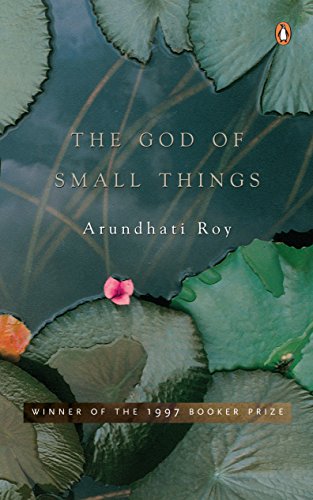
The year is 1969. In the state of Kerala, on the southernmost tip of India, a skyblue Plymouth with chrome tailfins is stranded on the highway amid a Marxist workers' demonstration. Inside the car sit two-egg twins Rahel and Esthappen, and so begins their tale. . . .
Armed only with the invincible innocence of children, they fashion a childhood for themselves in the shade of the wreck that is their family--their lonely, lovely mother, Ammu (who loves by night the man her children love by day), their blind grandmother, Mammachi (who plays Handel on her violin), their beloved uncle Chacko (Rhodes scholar, pickle baron, radical Marxist, bottom-pincher), their enemy, Baby Kochamma (ex-nun and incumbent grandaunt), and the ghost of an imperial entomologist's moth (with unusually dense dorsal tufts).
When their English cousin, Sophie Mol, and her mother, Margaret Kochamma, arrive on a Christmas visit, Esthappen and Rahel learn that Things Can Change in a Day. That lives can twist into new, ugly shapes, even cease forever, beside their river "graygreen." With fish in it. With the sky and trees in it. And at night, the broken yellow moon in it.
The brilliantly plotted story uncoils with an agonizing sense of foreboding and inevitability. Yet nothing prepares you for what lies at the heart of it.
The God of Small Things takes on the Big Themes--Love. Madness. Hope. Infinite Joy. Here is a writer who dares to break the rules. To dislocate received rhythms and create the language she requires, a language that is at once classical and unprecedented. Arundhati Roy has given us a book that is anchored to anguish, but fueled by wit and magic.
--front flap
If the question ever comes up of how I got started to writing (seriously, earnestly, more than two sentences together) again, the finger-point will be to this book. Take, for example, this incidental little paragraph that is a short story all in itself:
"Esthappen steadied the little boat on the uneven earth floor with a few blocks of wood that he found in Velutha's workstation in the backyard. He gave Rahel a cooking ladle made of a wooden handle stuck through the polished half of a coconut shell.
The twins climbed into the vallom and rowed across vast, choppy waters. With a Thaiy thaiy thaka thaiy thaiy thome. And a jeweled Jesus watching.
He walked on water. Perhaps. But could He have swum on land?
In matching knickers and dark glasses? With His Fountain in a Love-In-Tokyo? In pointy shoes and a puff? Would He have had the imagination?"
See? Magical. I'm pretty sure I've never read a childhood (terror, exuberance, frightening lucidity) so perfectly captured as with The God of Small Things, dear Estha and Rahel, Ammu's beloved two-egg twins.
Reading updates
-
Started reading
-
18 May, 2009:
Finished reading
-
18 May, 2009:
Reviewed
